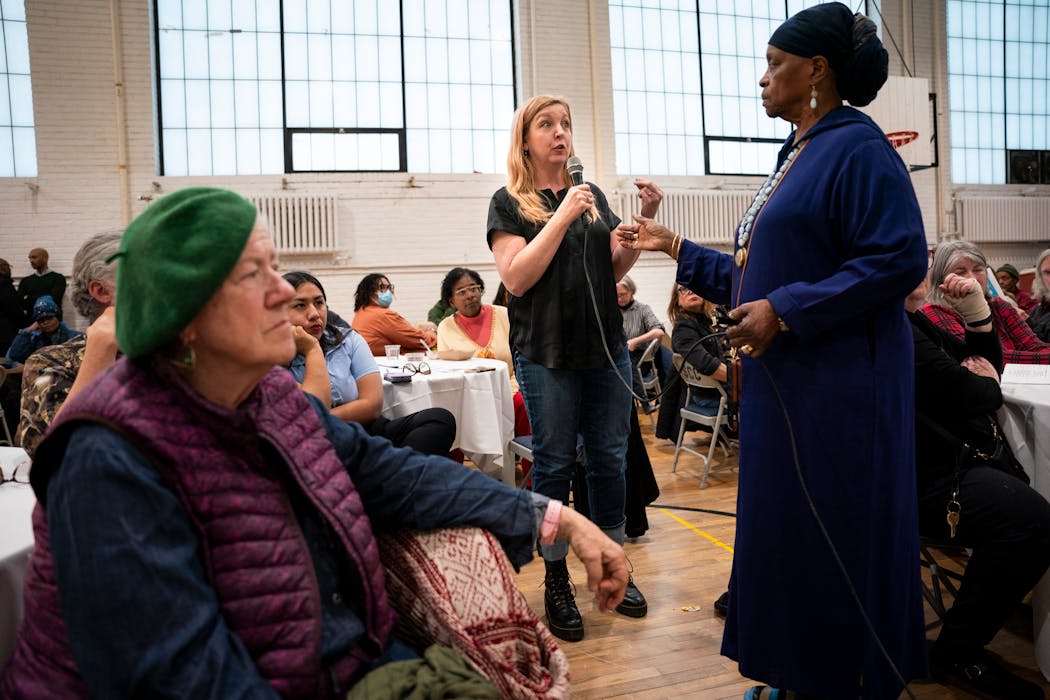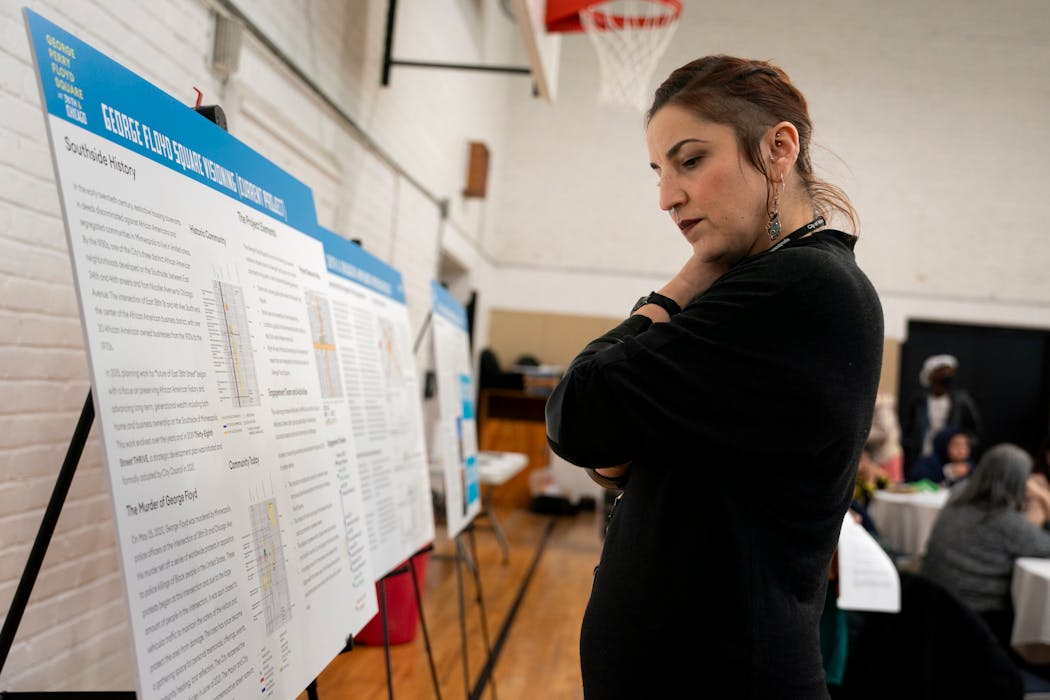Nearly four years after the murder of George Floyd by one of its police officers, the city of Minneapolis says it is drawing up a plan for the future of the intersection now referred to as George Floyd Square.
Construction around the area of 38th Street and Chicago Avenue in south Minneapolis isn't expected to happen until after 2026, but by December 2024 the city is due to release a vision document defining key unanswered questions about the site. They include:
⋅Whether the city should play any future role in the square's racial justice memorials, currently maintained by community volunteers.
⋅Who should own the People's Way, a former Speedway gas station converted to a protest headquarters.
⋅How the street itself should be redesigned to better enable delivery of basic services to an area that has been intermittently closed to outside traffic.
Convening community members around a shared vision for George Floyd Square has been a lengthy and often uncomfortable process. Divergent opinions over public safety, unresolved trauma and mistrust of the city's agenda permeated public engagement meetings last year.
"There's obviously a lot of sensitivity around what level of involvement does the city have in a man that they murdered, right?" said project manager Alexander Kado of the Office of Public Service. "We want to understand how can the city support that process, how can we preserve spaces in the right-of-way, remembering that George Floyd was murdered in the right-of-way? How do we preserve those spaces with this design process so that they're protected?"
Early steps
The city's efforts at community engagement have unfolded slowly and deliberately, and resulted in a bundle of local values including community safety, social justice, economic vitality and design that promotes healing.
In 2023, the city purchased the People's Way from a California real estate investment group after the burned body of a man was found inside the building. While some objected to the city taking ownership of an active protest site surrounded by community art, the city said buying the property was critical for liability and eventual redevelopment into something that benefits the area.
What kind of establishment the People's Way could be and who would own it remains up in the air. City officials seek to gather input at a series of community conversations, including a dinner and dialogue attended by about 200 people Thursday evening at the Sabathani Community Center.
"It's not all predetermined, because we want to use the information that we get from each session to actually dictate the next session," said Anthony Taylor of the Cultural Wellness Center, who's running engagement in 2024. "We have a structure, but it will also be organic and informed by the people participating in the process."
This year, the city will be asking the public to decide what sort of memorials to Floyd and racial justice should be installed at the square permanently, and whether the city should play any part. Mayor Jacob Frey has committed to the premise that no traffic should ever cross the spot where Floyd took his last breath, but beyond that, everything regarding a future memorial is open-ended.
Meanwhile, the actual streets of 38th and Chicago, built in the 1950s, are in need of a refresh. Protestors' closure of the intersection to transit in the aftermath of Floyd's murder changed its function.
The city on Thursday proposed a range of options for a future redesign, including: Open access for all modes of transportation including cars; limited access for pedestrians, bikes, buses and emergency, maintenance and delivery vehicles only; or a pedestrian mall with access only for critical vehicles. The last option would require passage of a bill allowing cities across the state to convert streets to pedestrian malls, which has also been suggested for a potential makeover of downtown's Nicollet Mall.
Community feedback
The purpose of Thursday's dinner was to gather more input about community priorities for the square. Some attendees wanted to move faster.
"It's been years since it occurred and I've been other places where George Floyd has been honored," said business owner Audra Robinson. "I would challenge everyone to go to Freedom Park in Raleigh, N.C., to see a great example of what can happen. Who is responsible, where's the committee and what is the planned date for something to be erected?"
Willie Frazier of Finish Touch Boutique, a longtime business owner based in George Floyd Square, also expressed his frustrations with how long the planning process has taken. "Do something!" he shouted. "I pay rent! Enough is enough ... Y'all don't know what's going on over there."
Others were glad they participated.
Linda Butlerattended the dinner with her granddaughter Renita Burrows and two teenage great-granddaughters. South Minneapolis was where Butler landed after leaving Chicago 20 years ago, and while she now lives in north Minneapolis, 38th and Chicago and the Sabathani Community Center remain close to her heart.
Asked to consider what she sees first when she enters George Floyd Square, Burrows said it feels a bit messy. But rounding the corner and glimpsing the mural by Peyton Scott Russell, she's reminded of the beauty coexisting alongside lingering trauma.
Butler said going to the square takes her right back to the nine minutes of Floyd's on-camera death, and the fear she felt in 2020 that her adopted diverse and progressive community of south Minneapolis wasn't what she'd thought it was.
"Being at the square, what is seen is a spirit of unity, a spirit of community, a spirit of solidarity," said Prince Corbett, the city's new director of Race Equity, Inclusion, and Belonging. "There's also a spirit of desperation and there's a spirit of sorrow. There's a spirit of something ... like the rose that grew up from the concrete, and that spirit's there."

Want to share info with the Star Tribune? How to do it securely

'Safe recovery sites' would offer syringes, naloxone and more to people using drugs. The plan could be in peril.
New Minnesota GOP leaders seek peace with party's anti-establishment wing

Who is Republican Lisa Demuth, Minnesota's first House speaker of color?




![A man bikes through the roundabout in front of Unity Foods Tuesday, Nov. 28, 2023, at George Floyd Square in Minneapolis, Minn. ]](https://arc.stimg.co/startribunemedia/BDIZMOTFINHEV4INY3OAYKVWUU.jpg?w=600&h=600&auto=format%2Ccompress&cs=tinysrgb)